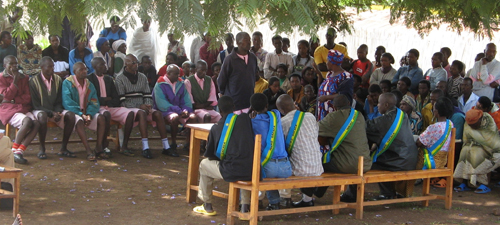Maître Albert Gasake (SURF) writes about the latest initiatives to address reparation to survivors of the Rwandan Genocide against the Tutsi in “Pan-African Reparation Perspectives”.
“Twenty years later, a new momentum to provide reparation for genocide victims in Rwanda”
Pan-African Reparation Perspectives: Special Bulletin on Reparation for Victims of International Crimes in Africa. Published by: Redress Pan-African Reparation Initiative — Issue 2 – July 2014
As the world commemorates the 20th anniversary of the genocide against the Tutsi in Rwanda, renewed efforts supporting survivors to realise their right to reparation are gaining traction.
Following a call from victim organisations in Rwanda for increased attention to the lack of a comprehensive reparation effort for victims of the genocide, the International Criminal Tribunal for Rwanda (ICTR) in December 2013 mandated the International Organisation for Migration (IOM) to conduct a study on the state of reparation for victims in post-genocide Rwanda.
In light of similar studies the IOM has carried out in, for instance, Sierra Leone, Colombia and the former Yugoslavia, the IOM is expected to provide technical input to stakeholders on the tangible ways forward for reparation for genocide victims, including the identification of feasible and suitable mechanisms for implementing and funding a comprehensive effort. To this end, the IOM will carry out broad consultations throughout the country with survivors and survivor organisations, as well as government representatives and relevant international and regional actors. international and regional actors.
In late February 2014, IOM carried out its first consultation visit in Rwanda, resulting in a collaboration with the government of Rwanda, as well as the main survivor organisations. This is sending important signals of hope for survivors: for the first time since the genocide the government of Rwanda – through the Minister of Justice and Attorney General of Rwanda- publicly recognised that survivors of the genocide have a right to reparation. The Minister of Justice expressed the government’s commitment to support initiatives addressing the right to reparation. In addition to the IOM study, the government announced the establishment of a new national forum for discussion on reparation within the Ministry of Justice to serve as a joint think-tank on how best to realise the right to reparation.
These developments are long overdue. For the past twenty years, survivors and survivor organisations have continuously called on the government of Rwanda as well as the international community to provide adequate reparation to survivors. However, their calls remained mostly unheard, instead, emphasis was placed on the prosecution of the perpetrators before traditional ‘gacaca’ (community) courts and the ICTR.

The majority, if not all of these prosecutions, relied heavily on survivors’ testimonies. For many of those who testified in proceedings before gacaca and the ICTR, their testimony came at a high price: survivors have been ostracized from their communities and continue to fear reprisals as a result of their testimonies. Women who were raped and who came forward with their testimonies frequently complain about being stigmatized and humiliated by their rapists. The closure of gacaca courts in July 2012, and the winding down of the ICTR left survivors disillusioned by the justice processes they have done so much to support. Failure by national and international processes to provide reparation for victims and survivors with reparation, has left a sense of unfinished business.
For genocide survivors, reparation is the most tangible manifestation of the state and the international community’s efforts in acknowledging and repairing their lives. The IOM study, carried out on in collaboration with the Government of Rwanda and civil society, is an encouraging step in the right direction. It is expected that the IOM’s final report will outline the roadmap for the way forward and include recommendations for all actors involved including the government of Rwanda and the international community.
The real test however will be whether there will be the necessary political will to implement the recommendations in practice and provide adequate reparation to survivors.
